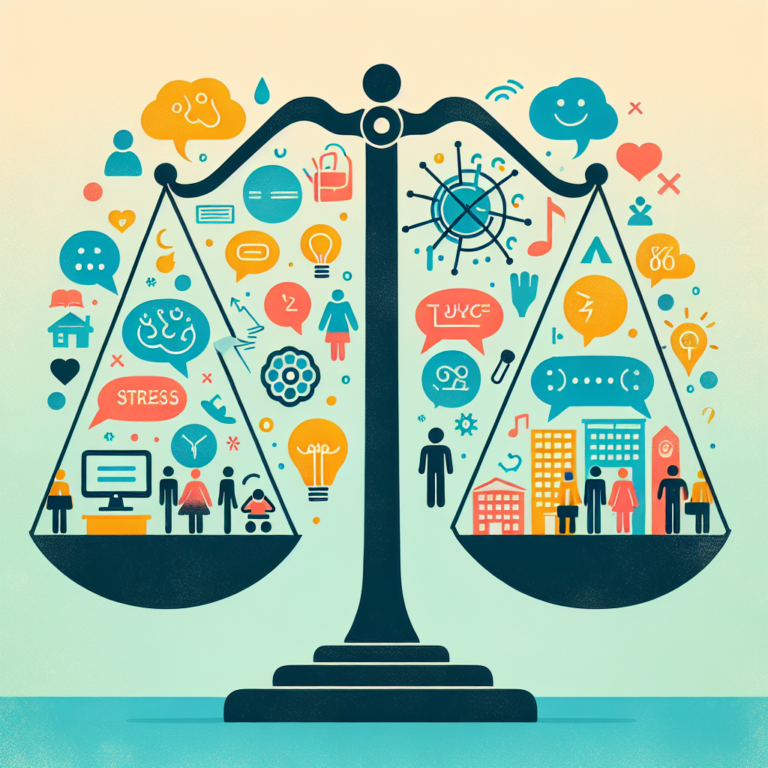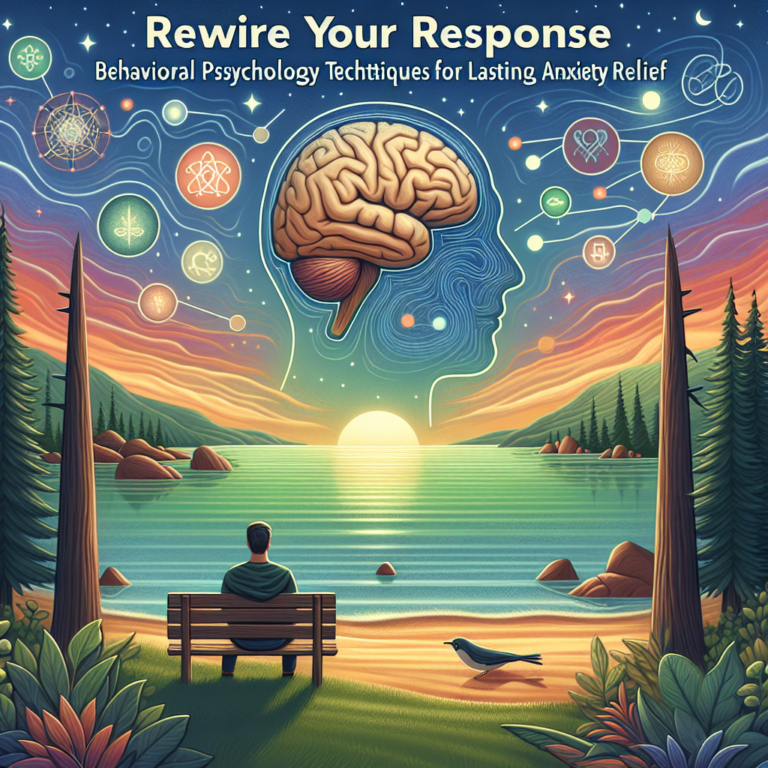
The Power of Behavior: How Behavioral Psychology Therapy Can Change Your Life
Introduction
Imagine waking up every day feeling empowered, motivated, and ready to take on the world. The energy you exude is infectious, and your relationships flourish as you embrace a more fulfilling life. This transformation isn’t just a dream; it’s a reality made possible through one profound concept: The Power of Behavior. How Behavioral Psychology Therapy Can Change Your Life encapsulates an essential understanding of how our behaviors shape not just our mental health, but our entire existence.
In a world filled with challenges and uncertainties, behavioral psychology offers a proven framework to understand and alter our thought patterns and behaviors. The relevance of this field cannot be overstated; it’s not merely a subject for academics but a crucial tool for anyone seeking personal growth and change, whether they are dealing with anxiety, depression, or simply a desire for a more empowered life.
In this article, we will delve deep into the mechanics of behavioral psychology therapy, highlighting its transformative power and real-world applications. You’ll gain insights, strategies, and inspiration to help you harness The Power of Behavior: How Behavioral Psychology Therapy Can Change Your Life.
Understanding Behavioral Psychology
Behavioral psychology, or behaviorism, is a branch of psychology that focuses on the relationship between our behaviors and the environment. While traditional methods often explore thoughts and emotions, behavioral psychology concentrates on observable behaviors and the conditioning processes that lead to certain patterns.
Key Principles of Behavioral Psychology
Behavior is Learned: Every action we take is learned through interaction with our environment. This means that unhelpful behaviors can be unlearned.
Reinforcement and Punishment: Behaviors can be modified using rewards (reinforcement) or consequences (punishment). Positive reinforcement encourages good behavior, while punishment discourages undesirable actions.
- Observable Change: Since behaviorism focuses on observable actions, progress is measured through tangible changes rather than internal thoughts or feelings.
The theoretical foundations of behavioral psychology lay the groundwork for various therapeutic techniques designed to facilitate change.
The Effectiveness of Behavioral Therapy
Behavioral therapy, including options like Cognitive Behavioral Therapy (CBT), exposure therapy, and others, has shown to be effective in treating a range of psychological disorders, from anxiety and PTSD to OCD and depression.
Case Study: Overcoming Anxiety with CBT
A young woman named Emily struggled with debilitating social anxiety. She avoided social situations, fearing judgment and embarrassment. Through a structured CBT program, she learned to identify and confront her irrational fears. Gradually, she was exposed to social settings, reinforcing positive behaviors and extinguishing negative thought patterns.
Relevance: Emily’s case exemplifies how The Power of Behavior in therapy can lead to profound life changes, demonstrating that behaviors can be reshaped, and anxiety can be to managed effectively.
How Behavioral Therapy Can Change Your Life
Building New Habits
One of the primary applications of behavioral psychology therapy is habit formation. Habits govern our daily lives, often unconsciously. The process of forming a new habit requires consistent reinforcement strategies.
Table: The Habit Loop
| Step | Description |
|---|---|
| Cue | A trigger that initiates the behavior |
| Routine | The actual behavior undertaken |
| Reward | The positive reinforcement received after the behavior |
Utilizing this loop, individuals can establish healthier habits—be it exercising, eating well, or practicing mindfulness. By understanding how cues influence routines and how rewards reinforce behaviors, anyone can cultivate habits that lead to a more fulfilling life.
Enhancing Relationships
Our behaviors directly impact our relationships. Through behavioral therapy, individuals learn effective communication skills, conflict resolution, and empathy. Couples therapy, grounded in behavioral principles, helps partners understand how their actions affect each other.
Case Study: Improving Communication in Relationships
Mark and Jane were on the verge of separation. Frequent misunderstandings led to escalating conflicts. After enrolling in couples therapy that utilized behavioral strategies, they learned to express their needs and negotiation techniques to resolve conflicts constructively.
Analysis: This case highlights The Power of Behavior: How Behavioral Psychology Therapy Can Change Your Life not only improves individual mental health but also nurtures interpersonal relationships, paving the way for deeper connections.
Managing Stress and Anxiety
Behavioral strategies offer tools for coping with stress. Techniques such as exposure therapy help individuals confront their fears in a controlled environment, gradually reducing anxiety levels.
Case Study: Exposure Therapy for Phobia
Tom had a chronic fear of flying. Undergoing exposure therapy, he was gradually exposed to various aspects of air travel, from watching planes take off to eventually boarding a flight. This gradual exposure helped him overcome his phobia.
Relevance: Tom’s journey illustrates how The Power of Behavior in behavioral therapy can help individuals face and conquer their fears, leading to greater freedom and lifestyle improvements.
Boosting Motivation and Productivity
Understanding behavior and motivation is pivotal in mental health and personal achievement. Behavioral therapy can assist individuals in overcoming procrastination, setting achievable goals, and boosting productivity.
Chart: Stages of Change Model
| Stage | Description |
|---|---|
| Precontemplation | Not yet acknowledging a problem |
| Contemplation | Awareness of a problem and thinking about change |
| Preparation | Preparing to take action |
| Action | Active change taking place |
| Maintenance | Sustaining new behaviors |
Utilizing this model, people can pinpoint their current stage regarding personal goals and employ behavioral strategies tailored to advance through each stage.
Tools and Techniques in Behavioral Therapy
1. Behavioral Activation
This approach encourages individuals to engage in activities that align with their values, even when they don’t feel motivated. It helps break the cycle of negative thinking by promoting action.
2. Cognitive Restructuring
Although this leans towards cognitive therapy, identifying negative thoughts and reframing them is crucial in behavioral therapy. It assists in breaking down the link between thoughts and unhelpful behaviors.
3. Mindfulness Practices
Mindfulness involves being present in the moment, which can mitigate stress and anxiety. Techniques like deep breathing or meditation can profoundly change one’s behavioral responses to triggers.
Conclusion
Harnessing The Power of Behavior: How Behavioral Psychology Therapy Can Change Your Life is about recognizing the malleable nature of our behaviors and using that knowledge to foster positive change. Whether it means building healthier habits, improving relationships, managing anxiety, or enhancing productivity, the strategies outlined in this article illustrate that true change is possible when we commit to understanding and altering our actions.
Now, as you reflect on your own life and behaviors, think about how you can apply these insights today. Remember, small changes pave the way for significant transformations.
FAQs
1. What is behavioral psychology therapy?
Behavioral psychology therapy focuses on changing unhelpful behaviors through various techniques including reinforcement strategies and cognitive restructuring.
2. How does behavioral therapy help with anxiety?
Behavioral therapy, such as CBT or exposure therapy, helps individuals identify and confront irrational fears, thereby reducing anxiety levels through gradual exposure to those fears.
3. Can behavioral therapy improve relationships?
Yes! Behavioral therapy teaches effective communication and conflict resolution techniques which can significantly improve interpersonal dynamics.
4. What are some common behavioral therapy techniques?
Common methods include behavioral activation, cognitive restructuring, and mindfulness practices.
5. How long does it take to see results from behavioral therapy?
The duration varies per individual and their issues, but many notice improvements in a few sessions. Consistency and commitment are key.
By exploring these facets of The Power of Behavior: How Behavioral Psychology Therapy Can Change Your Life, you empower yourself to embrace change, develop new habits, and live a more enriched life. The possibilities are indeed endless.















